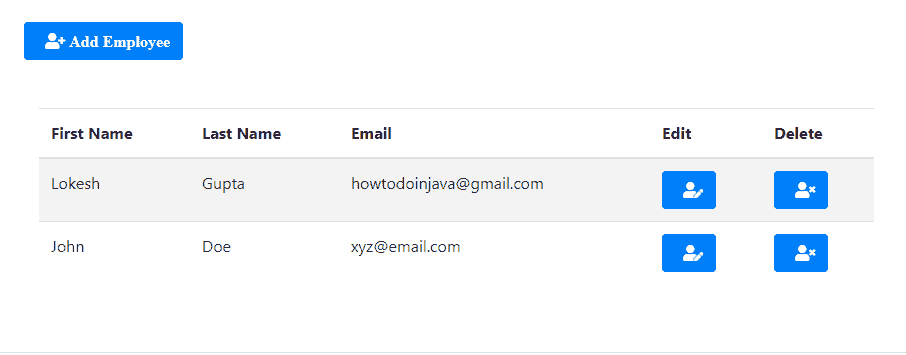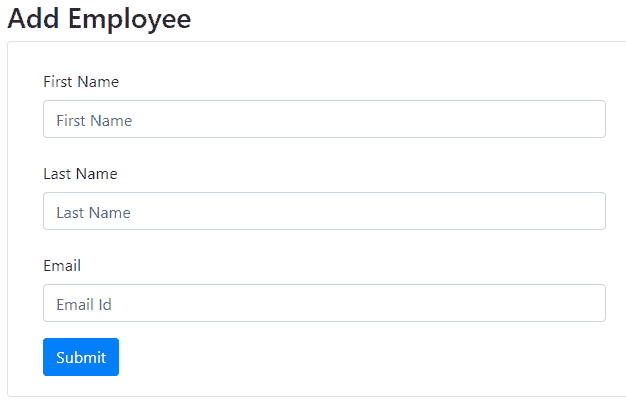Spring Boot – CRUD 应用程序
原文: https://howtodoinjava.com/spring-boot2/crud-application-thymeleaf/
通过基于 Thymeleaf 和 spring mvc 支持的基于表单的 UI,学习构建支持 CRUD 操作的 Spring Boot Web 应用程序。
1. 概述
在本教程中,我们正在创建具有两个视图的 Web 应用程序:
-
列出所有员工视图 – 以表格形式在 UI 中从数据库显示所有员工。 此外,还有指向“更新”或“删除”任何员工的链接。 该界面还具有一个单独的选项,可以导航到“创建”员工界面。

列出所有员工的界面
-
创建/更新员工视图 – 此界面用于添加新员工或编辑现有员工的详细信息。

添加员工的界面
此示例中有两个主要组件需要重点关注-MVC 控制器和 UI 视图。
2. Spring MVC 控制器
控制器类具有 URL 映射及其处理器方法。 所有 CRUD 操作都有处理器方法,包括 POST 操作,以处理表单提交以创建/更新员工的过程。
注意给定的处理器方法如何将模型数据绑定到视图; 并且它们以字符串格式返回视图名称,该视图名称由 HTML 文件中的视图解析器解析。
EmployeeMvcController.java
import java.util.List;
import java.util.Optional;
import org.springframework.beans.factory.annotation.Autowired;
import org.springframework.stereotype.Controller;
import org.springframework.ui.Model;
import org.springframework.web.bind.annotation.PathVariable;
import org.springframework.web.bind.annotation.RequestMapping;
import org.springframework.web.bind.annotation.RequestMethod;
import com.howtodoinjava.demo.entity.EmployeeEntity;
import com.howtodoinjava.demo.exception.RecordNotFoundException;
import com.howtodoinjava.demo.service.EmployeeService;
@Controller
@RequestMapping("/")
public class EmployeeMvcController
{
@Autowired
EmployeeService service;
@RequestMapping
public String getAllEmployees(Model model)
{
List<EmployeeEntity> list = service.getAllEmployees();
model.addAttribute("employees", list);
return "list-employees";
}
@RequestMapping(path = {"/edit", "/edit/{id}"})
public String editEmployeeById(Model model, @PathVariable("id") Optional<Long> id)
throws RecordNotFoundException
{
if (id.isPresent()) {
EmployeeEntity entity = service.getEmployeeById(id.get());
model.addAttribute("employee", entity);
} else {
model.addAttribute("employee", new EmployeeEntity());
}
return "add-edit-employee";
}
@RequestMapping(path = "/delete/{id}")
public String deleteEmployeeById(Model model, @PathVariable("id") Long id)
throws RecordNotFoundException
{
service.deleteEmployeeById(id);
return "redirect:/";
}
@RequestMapping(path = "/createEmployee", method = RequestMethod.POST)
public String createOrUpdateEmployee(EmployeeEntity employee)
{
service.createOrUpdateEmployee(employee);
return "redirect:/";
}
}
getAllEmployees()– 返回所有员工的列表,并映射到路径/。 这是应用程序的默认视图。editEmployeeById()– 用于添加新员工或编辑现有员工。 两种操作都使用相同的 HTML 视图。 如果上下文中有一个员工 ID,则将对该员工进行编辑-否则将创建一个新员工。deleteEmployeeById()– 通过 ID 删除员工的简单 URL 请求。createOrUpdateEmployee()– 此方法处理用于创建新雇员或更新雇员的 HTTP POST 请求。 创建或更新操作取决于模型中是否存在员工 ID。
3. Thymeleaf 模板
如前所述,我们在此示例中使用两个视图。
list-employees.html
<!DOCTYPE html>
<html xmlns:th="http://www.thymeleaf.org">
<head>
<meta charset="utf-8">
<meta http-equiv="x-ua-compatible" content="ie=edge">
<title>All Employees</title>
<meta name="viewport" content="width=device-width, initial-scale=1">
<link rel="stylesheet" href="https://stackpath.bootstrapcdn.com/bootstrap/4.1.3/css/bootstrap.min.css">
<link rel="stylesheet" href="https://use.fontawesome.com/releases/v5.4.1/css/all.css">
</head>
<body>
<div class="container my-2">
<div class="card">
<div class="card-body">
<div th:switch="${employees}" class="container my-5">
<p class="my-5">
<a href="/edit" class="btn btn-primary">
<i class="fas fa-user-plus ml-2"> Add Employee </i></a>
</p>
<div class="col-md-10">
<h2 th:case="null">No record found !!</h2>
<div th:case="*">
<table class="table table-striped table-responsive-md">
<thead>
<tr>
<th>First Name</th>
<th>Last Name</th>
<th>Email</th>
<th>Edit</th>
<th>Delete</th>
</tr>
</thead>
<tbody>
<tr th:each="employee : ${employees}">
<td th:text="${employee.firstName}"></td>
<td th:text="${employee.lastName}"></td>
<td th:text="${employee.email}"></td>
<td>
<a th:href="@{/edit/{id}(id=${employee.id})}"
class="btn btn-primary">
<i class="fas fa-user-edit ml-2"></i>
</a>
</td>
<td>
<a th:href="@{/delete/{id}(id=${employee.id})}"
class="btn btn-primary">
<i class="fas fa-user-times ml-2"></i>
</a>
</td>
</tr>
</tbody>
</table>
</div>
</div>
</div>
</div>
</div>
</div>
</body>
</html>
add-edit-employee.html
<!DOCTYPE html>
<html xmlns:th="http://www.thymeleaf.org">
<head>
<meta charset="utf-8">
<meta http-equiv="x-ua-compatible" content="ie=edge">
<title>Add Employee</title>
<meta name="viewport" content="width=device-width, initial-scale=1">
<link rel="stylesheet" href="https://stackpath.bootstrapcdn.com/bootstrap/4.1.3/css/bootstrap.min.css">
<link rel="stylesheet" href="https://use.fontawesome.com/releases/v5.4.1/css/all.css">
</head>
<body>
<div class="container my-5">
<h3> Add Employee</h3>
<div class="card">
<div class="card-body">
<div class="col-md-10">
<form action="#" th:action="@{/createEmployee}" th:object="${employee}"
method="post">
<div class="row">
<div class="form-group col-md-8">
<label for="name" class="col-form-label">First Name</label>
<input type="text" th:field="*{firstName}" class="form-control"
id="firstName" placeholder="First Name" />
</div>
<div class="form-group col-md-8">
<label for="name" class="col-form-label">Last Name</label>
<input type="text" th:field="*{lastName}" class="form-control"
id="lastName" placeholder="Last Name" />
</div>
<div class="form-group col-md-8">
<label for="email" class="col-form-label">Email</label>
<input type="text" th:field="*{email}" class="form-control"
id="email" placeholder="Email Id" />
</div>
<div class="col-md-6">
<input type="submit" class="btn btn-primary" value=" Submit ">
</div>
<input type="hidden" id="id" th:field="*{id}">
</div>
</form>
</div>
</div>
</div>
</div>
</body>
</html>
4. 实体和存储库
我们已经将EmployeeEntity类作为模型绑定到 UI。
EmployeeEntity.java
import javax.persistence.Column;
import javax.persistence.Entity;
import javax.persistence.GeneratedValue;
import javax.persistence.Id;
import javax.persistence.Table;
@Entity
@Table(name="TBL_EMPLOYEES")
public class EmployeeEntity {
@Id
@GeneratedValue(strategy = GenerationType.IDENTITY)
private Long id;
@Column(name="first_name")
private String firstName;
@Column(name="last_name")
private String lastName;
@Column(name="email", nullable=false, length=200)
private String email;
//Setters and getters
@Override
public String toString() {
return "EmployeeEntity [id=" + id + ", firstName=" + firstName +
", lastName=" + lastName + ", email=" + email + "]";
}
}
为了将数据持久存储在数据库中,我们使用 H2(内存中)数据库,并使用 Spring 数据的CrudRepository接口。 它为简单的 CRUD 操作提供了开箱即用的内置方法。
EmployeeRepository.java
import org.springframework.data.repository.CrudRepository;
import org.springframework.stereotype.Repository;
import com.howtodoinjava.demo.entity.EmployeeEntity;
@Repository
public interface EmployeeRepository
extends CrudRepository<EmployeeEntity, Long> {
}
请注意,使用两个 SQL 文件初始化了存储库,这两个 SQL 文件创建数据库表并向其中填充默认数据。
schema.sql
DROP TABLE IF EXISTS TBL_EMPLOYEES;
CREATE TABLE TBL_EMPLOYEES (
id INT AUTO_INCREMENT PRIMARY KEY,
first_name VARCHAR(250) NOT NULL,
last_name VARCHAR(250) NOT NULL,
email VARCHAR(250) DEFAULT NULL
);
data.sql
INSERT INTO
TBL_EMPLOYEES (first_name, last_name, email)
VALUES
('Lokesh', 'Gupta', 'howtodoinjava@gmail.com'),
('John', 'Doe', 'xyz@email.com');
5. 服务类
另一个重要的类是EmployeeService类,控制器通过该类与存储库进行交互。 它包含要执行的其他业务逻辑。
EmployeeService.java
import java.util.ArrayList;
import java.util.List;
import java.util.Optional;
import org.springframework.beans.factory.annotation.Autowired;
import org.springframework.stereotype.Service;
import com.howtodoinjava.demo.entity.EmployeeEntity;
import com.howtodoinjava.demo.exception.RecordNotFoundException;
import com.howtodoinjava.demo.repository.EmployeeRepository;
@Service
public class EmployeeService {
@Autowired
EmployeeRepository repository;
public List<EmployeeEntity> getAllEmployees()
{
List<EmployeeEntity> result = (List<EmployeeEntity>) repository.findAll();
if(result.size() > 0) {
return result;
} else {
return new ArrayList<EmployeeEntity>();
}
}
public EmployeeEntity getEmployeeById(Long id) throws RecordNotFoundException
{
Optional<EmployeeEntity> employee = repository.findById(id);
if(employee.isPresent()) {
return employee.get();
} else {
throw new RecordNotFoundException("No employee record exist for given id");
}
}
public EmployeeEntity createOrUpdateEmployee(EmployeeEntity entity)
{
if(entity.getId() == null)
{
entity = repository.save(entity);
return entity;
}
else
{
Optional<EmployeeEntity> employee = repository.findById(entity.getId());
if(employee.isPresent())
{
EmployeeEntity newEntity = employee.get();
newEntity.setEmail(entity.getEmail());
newEntity.setFirstName(entity.getFirstName());
newEntity.setLastName(entity.getLastName());
newEntity = repository.save(newEntity);
return newEntity;
} else {
entity = repository.save(entity);
return entity;
}
}
}
public void deleteEmployeeById(Long id) throws RecordNotFoundException
{
Optional<EmployeeEntity> employee = repository.findById(id);
if(employee.isPresent())
{
repository.deleteById(id);
} else {
throw new RecordNotFoundException("No employee record exist for given id");
}
}
}
6. 添加 Spring Boot 和 Thymeleaf Maven 依赖项
在 spring boot 项目中,我们只需要添加spring-boot-starter-thymeleaf依赖项,并使用默认配置为项目本身自动配置 thymeleaf。 它从/src/main/resources/templates文件夹中读取 HTML 模板。
pom.xml
<?xml version="1.0" encoding="UTF-8"?>
<project xmlns="http://maven.apache.org/POM/4.0.0"
xmlns:xsi="http://www.w3.org/2001/XMLSchema-instance"
xsi:schemaLocation="http://maven.apache.org/POM/4.0.0 http://maven.apache.org/xsd/maven-4.0.0.xsd">
<modelVersion>4.0.0</modelVersion>
<parent>
<groupId>org.springframework.boot</groupId>
<artifactId>spring-boot-starter-parent</artifactId>
<version>2.1.5.RELEASE</version>
<relativePath /> <!-- lookup parent from repository -->
</parent>
<groupId>com.howtodoinjava</groupId>
<artifactId>demo</artifactId>
<version>0.0.1-SNAPSHOT</version>
<name>demo</name>
<description>Demo project for Spring Boot</description>
<properties>
<java.version>1.8</java.version>
</properties>
<dependencies>
<dependency>
<groupId>org.springframework.boot</groupId>
<artifactId>spring-boot-starter-web</artifactId>
</dependency>
<dependency>
<groupId>org.springframework.boot</groupId>
<artifactId>spring-boot-starter-data-jpa</artifactId>
</dependency>
<dependency>
<groupId>org.springframework.boot</groupId>
<artifactId>spring-boot-starter-thymeleaf</artifactId>
</dependency>
<dependency>
<groupId>com.h2database</groupId>
<artifactId>h2</artifactId>
<scope>runtime</scope>
</dependency>
<dependency>
<groupId>org.springframework.boot</groupId>
<artifactId>spring-boot-starter-test</artifactId>
<scope>test</scope>
</dependency>
</dependencies>
</project>
7. Spring Boot thymeleaf Crud 教程演示
以 Spring Boot 应用程序的形式启动此应用程序,该应用程序将在嵌入式 tomcat 服务器中启动 Web 应用程序。
点击网址:http://localhost:8080/
验证是否使用data.sql文件中的两个默认员工详细信息渲染了屏幕。
玩应用程序。 创建几个新员工,编辑现有员工。 删除一些员工。
如果在上述 spring boot mvc 示例中遇到任何错误,请告诉我。
学习愉快!